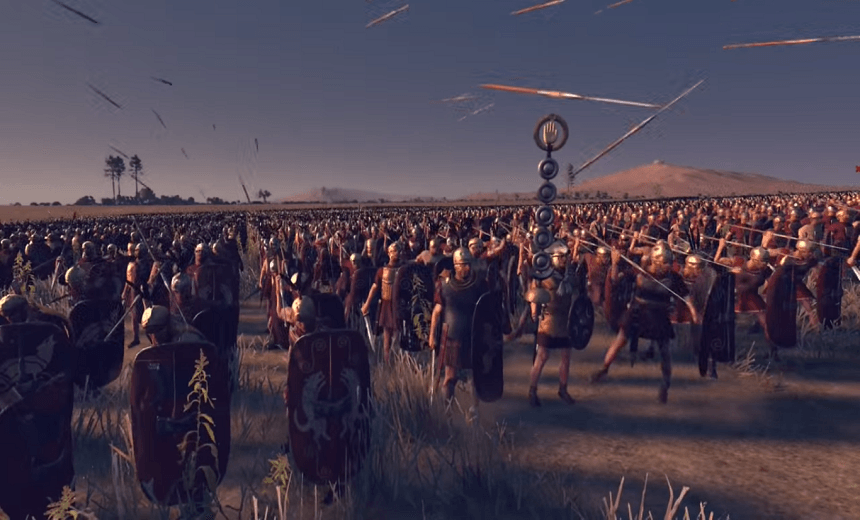Don Rowe slept through high school history. Now he’s a quasi-scholar of the ancient world thanks to a series of videos from an anonymous American gamer.
Anyone who’s taken a high school history class knows how quickly the stories of humanity’s most horrific, bloody and grueling armed conflicts can turn into potent sedatives when relayed by an underpaid, possibly depressed, certainly uninspired teacher. Epic dynasties, deified kings, desert battles with hundreds and thousands of casualties, all somehow made intolerably boring by the monotonous intonations of some ancient scholar. It doesn’t matter how well armored Caesar’s legions were, how thick their ranks, if they’re described like a shoddy antique.
The real challenge in accurately articulating the sheer intensity of ancient warfare may have something to do with the lack of illustration. We can all imagine a group of mud-soaked grunts in a trench on Flanders Fields because we’ve seen the pictures and heard the poetry. Same goes for any conflict since. Hell, we can watch the current strife in the Middle East in glorious 1080p from the POV of a US Marine thanks to modern technology like GoPros and wireless internet. The same doesn’t exactly hold true for the barbarian hordes of ancient Gaul, or the pike walls of Alexander the Great.
In fact, the most prominent recent depictions of Hellenic warfare come in the form of 2004 box office hits Troy and Alexander, both of which cost in excess of US$150 million to produce, and neither of which were particularly concerned with historical accuracy.
However, in the tradition of all good disruptive artists, an engineering student from somewhere in the States is creating free documentaries on pre- and post-Marian Rome with nothing more than a quality graphics card and his own knowledge of military history and generalship.
Through the medium of Creative Arts’ Total War series, particularly Rome 2, Oakley (real name unknown) brings viewers into the ranks of Hannibal’s Carthaginians at Cannae as they slaughter 86,000 consular troops in one of the defining battles of the Second Punic Wars, or out onto the shaky left wing of the doomed assault at Adrianople. With an in-depth knowledge of warfare, logistics and even the socio-economic reasoning behind an armies composition, Oakley creates masterful historical documentaries with more depth than the entirety of the History Channel. I can’t stop watching them.
The Total War games have always felt a little like Age of Empires for big kids to me. While they’re not Euro Truck Simulator levels of realism, there’s still an emphasis on strategy and some semblance of historical accuracy. Leave your archers exposed, for example, and you’ll quickly see them run down and slaughtered by a swarm of cavalry. Charge those same horses onto a pike wall, however, and it’s kebab city.
The character models in Rome 2 react appropriately, for the most part, in terms of collision animations and the like. That means, for example, an elephant running full speed into a group of lightly armored peasants is going to send a few flying and crush the rest into the floor. Additionally, units contain hundreds of beautifully designed soldiers at a time as opposed to Age of Empires‘ clunky one man armies.
These elements all combine into an immensely playable and satisfying game, but where Total War transcends RTS and becomes a medium for documentary film making is in it’s cinematic mode which reduces elements such as the HUD and allows free camera roam across the battlefield. It’s here that Oakley does his best work, capturing scenes that convey the sense of scale and confusion common in ancient warfare. And because of his access and willingness to use primary and secondary sources, he makes observations around the nature of perspective on the battlefield, and the ways in which generals utilised their knowledge of concepts as disparate as psychology and meteorology – the sort of thing entirely missing from Brad Pitt’s depiction of Achilles.
At times, particularly in his more recent work, Oakley’s voice-over can be a little forced and breathless, however it’s forgivable when one considers that A) it’s free entertainment, and B) I might feel the need to put a bit of emphasis on the words of someone like Hannibal too. Plus, when you’re nailing names like Gaius Terentius Varro and Lucius Aemilius Paullus without missing a step, you can afford to get overexcited.
I just hope Creative Art’s doesn’t sue him with the force of a thousand legions.
This post, like all of our gaming content, is brought to you by the ISP legends over at Big Pipe.
